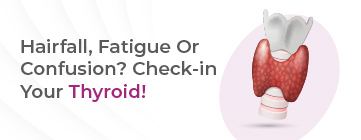Frequently Asked Questions
The first signs of thyroid problems usually include unexpected weight gain or loss, mood swings, fatigue, irregular menstrual cycles, irritability, or nervousness. These symptoms can vary from person to person. If you notice any of these changes happening consistently, it’s important to get your thyroid level tested.
The main job of the thyroid gland is to control hormones and manage metabolism, which helps turn food into energy. If your thyroid isn’t working properly, you may feel tired, moody, or low on energy. It can affect how your whole body functions. Also, thyroid symptoms often look similar to other health problems, so your doctor may suggest a thyroid test to find the exact cause.
The normal range for thyroid hormone levels in the general population is 0.4–4.5 mIU/L. This may vary depending on different labs.
For pregnant women, the recommended thyroid levels are:
- First trimester: 0.1–2.5 mIU/L
- Second trimester: 0.2–3.0 mIU/L
- Third trimester: 0.3–3.5 mIU/L
A thyroid profile includes testing of three key hormones: T3 (triiodothyronine), T4 (thyroxine), and TSH (thyroid-stimulating hormone). These hormones help control your energy and metabolism. By checking these levels, your doctor can see how well your thyroid is working and assess its overall health.
No, you don’t need to fast for a thyroid test. You can eat and drink normally unless your doctor recommends you otherwise.
It’s best to get a thyroid test done in the morning because TSH levels change throughout the day. A morning sample gives the most accurate and reliable results.
The cost of thyroid testing can vary depending on where you get it done. A simple TSH test usually costs less, while a full thyroid panel with T3, T4, and other hormones can be more expensive. Many labs, including LifeCell Diagnostics, also offer at-home options at convenient rates.
Yes! You can book a thyroid test with LifeCell Diagnostics, which offers sample collection at home. A trained professional will visit your home, take your blood sample, and you’ll receive your results conveniently.
It depends on your health and your doctor’s advice. If you have a thyroid condition, you may need to get tested every few months. If your thyroid is functioning normally, testing may be needed only once a year or as recommended by your doctor.
Thyroid test results usually take 1–2 days for standard tests like TSH, T3, and T4. More detailed or specialised tests, such as antibody tests, may take 3–5 days. Your lab or doctor will let you know exactly when to expect your results.





